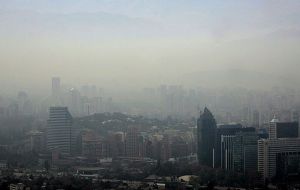MercoPress. South Atlantic News Agency
Severe air pollution plagues Chilean cities
 Santiago City under environmental alert
Santiago City under environmental alert Cold winter conditions and the lack of wind are exacerbating air-quality problems in Santiago and Chillán; pollution in both cities has reached extreme levels.
Chillán, a city south of Santiago known for its skiing and thermal baths, now ranks as the fourth most contaminated city in Chile (behind Santiago, Temuco, and Concepción). A 2004 study by the University of Concepción determined air pollution levels in Chillán at 170 milligrams of contaminated material per cubic meter, 20 milligrams over the legal limit. As in Temuco, the main cause of air pollution in Chillán is the use of wood-burning stoves: about 62% of all households in Chillán use firewood as their main source of heating. Many people do not use environmentally friendly firewood, preferring less expensive, less thoroughly burnable wood. Many people also wet their firewood before burning it, believing that this will generate more warmth, though it actually just causes more pollution. In Santiago, an environmental alert was issued on Wednesday, the fifteenth of its kind over the past six weeks. An air-quality pre-emergency situation is expected to be declared on Friday or Saturday, according to Manuel Merino, head of the National Environmental Center's Atmospheric Analysis Laboratory, the organization responsible for advising the government on whether or not to issue an environmental warning. "What's coming now is a gradual worsening of the air quality. Ventilation conditions will be between normal and bad â€Ã‚¦ Eventually, we could reach a pre-emergency on Friday or early Saturday, because ventilation conditions will go from bad to critical," explained Merino. Two official pre-emergencies have been declared in Santiago this year, though five days qualified as "pre-emergency" due to Particular Air Quality Index (or ICAP) levels over 300. The cold weather and poor air quality have also caused a sharp increase in the incidence of respiratory illnesses among Santiago residents. Children and the elderly are the most vulnerable to these illnesses, which occur mostly in the capital's lower-elevation, more highly-contaminated western sector. Last week, Cerro Navia Mayor Cristina Girardi requested that a special health-care envoy be sent to monitor critical cases in her community. The Santiago Times




Top Comments
Disclaimer & comment rulesCommenting for this story is now closed.
If you have a Facebook account, become a fan and comment on our Facebook Page!